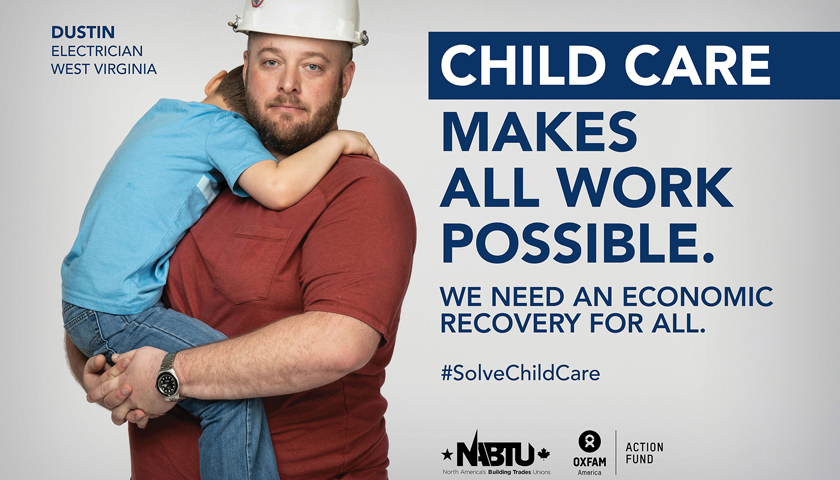“No Work is Possible without Child Care” – Working parents in West Virginia call on Congress to invest in child care in order to help fill jobs and build a strong national infrastructure
A new ad campaign featuring building trades workers and a child care provider from West Virginia will run throughout the state and in Washington, D.C. during the months of April and May. The ads call attention to the essential need for affordable and accessible child care in order for parents to fully participate in the labor force, contribute to a thriving economic recovery, and implement the massive infrastructure investment signed into law last November.
“The American way is to work. If you don’t have somewhere for your children to go that’s an educational, safe place, then how can you go to work?” says Dustin, a union electrician and working father from West Virginia featured in the ad campaign.
While Washington approved the $1 trillion bipartisan infrastructure law to invest in our nation’s bridges, roads, broadband and beyond, failed attempts to invest in making child care more affordable and accessible to parents are strapping families financially and holding parents back from filling badly needed jobs that will implement the federal infrastructure investment law and rebuild America.
“We are profoundly grateful for the $6 billion federal investment in West Virginia, but to fill those jobs and build that infrastructure, we need parents who can find care for their children wherever they live, at all times of day and for an affordable cost,” said Steve White, Director of the Affiliated Construction Trades in West Virginia.
Ashley, a union electrician and working mother from West Virginia featured in the ad campaign, knows first-hand how lack of access to child care affects her ability to work: “I’m assisting to build a high school right now. If we want those things to get done in a timely manner, those parents have to be able to work too. If we don’t have child care, how can we work?”
The new ads are co-sponsored by Oxfam America, North America’s Building Trades Unions, Center for Law and Social Policy, Service Employees International Union, and the National Women’s Law Center.
“Child care historically has been perceived as a personal issue rather than a collective one. But times have changed. We need flexible, safe, and reliable child care options for working parents in our industry. We call on Congress to help our workers get to work and implement this transformational infrastructure plan by investing in child care support for the many parents in our industry,” said Sean McGarvey, President of North America’s Building Trades Unions.
One-third of the US workforce—an estimated 50 million workers—have a child under 14 years old in their household. Even before the pandemic, inadequate child care cost working parents $57 billion a year in lost income and cost employers $13 billion a year in lost productivity. And many working parents had used the now-expired child tax credit and the independent child care tax credit to cover child care costs.
The organizations are asking Congress to include robust child care investments in the next reconciliation bill to ensure that families are able to find child care for their babies and toddlers—and should be required to pay no more than 7 percent of their annual income on child care costs.
“Oxfam America recently found that more than 52 million workers across the US are making less than $15 an hour—the majority of them women and people of color. The cost of child care should not be an additional burden to families, most of whom are also struggling with skyrocketing costs of basic goods. All workers urgently need living wages, especially the child care providers who we rely on to educate and care for our youngest children,” said Abby Maxman, Oxfam America’s President and CEO.
Any child care provisions in the next reconciliation bill also need to include living wages for child care workers. According to The National Women’s Law Center, the poverty rate among child care workers is more than double that of women workers in other fields, and these positions are disproportionately held by women of color. Providing these workers with a living wage is not only the right thing to do, it will also help increase the supply of child care for families.
“I’ve been with Head Start for 26 years. I make $12.70 an hour. They can’t hire anybody because you can go to McDonalds and start at $10-11 an hour. There’s some great people that we’ve lost because of that. One of my teacher’s aides left … I just lost my bus driver,” said Vikki, a Head Start teacher from West Virginia featured in the ads.
